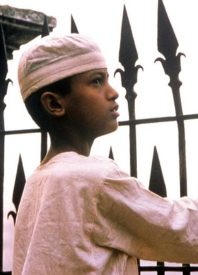
What are past and future generations teaching children? Or what are they teaching each other? Those are a few of the questions that Tareque Masud’s The Clay Bird asks. It’s a film depicting a child going to a madrasa in what was East Pakistan. That child is Anu (Nurul Islam Bablu), who finds a friend in a fellow outcast, Rokon (Russell Farazi). Anu presumably sends his weekdays sleeping in the madrasa in town and going back home during the weekends. And the film depicts both places as he and his family face personal and larger troubles. Troubles that members of the family viewers see try to escape.
Clay Bird is the other war film that came out in 2002. Having a child be a centre of a pre-war film wouldn’t be a trope until later that decade. Those films are usually gloomy. This one however gives breaks from all the political and personal tension that these characters feel on a daily basis. Also, unlike those films, the adults are just as interesting or more interesting than the children. Anu’s mother Ayesha (Rokeya Prachy) tries to feed him and his sister Asma (Lameesa R. Reemjheem) while living under the cloud of his father Kazi (Jayanto Chattopadhyay). This family is one of many in what will be Bangladesh. It’s a country with a large population with films that the West barely see.
Clay Bird has a lot of dialogue, approaching both important political and personal events through that dialogue instead of showing those events take place. This is an interesting approach to its subjects and one that it does well. Anu learns about Ayesha and Kazi as a young couple instead of the camera flashing back to those events. This film is one about outside perspectives. And it argues that those perspectives are as valid as seeing events from the inside. This film depict these conversations and uses Bangladesh’s lush riversides as its backdrop. These vistas add gravitas and majesty to the events that are unfolding.
Religion also plays a big role in Clay Bird but not as big as previous criticism about it might suggest. That writing makes Kazi out as a hardliner, and he is during the film’s first act. A lesser film would have kept him that way even after Asma’s death. But that event turns him to someone who compromises with Ayesha, even if that strategy doesn’t work on her as much as he wishes it does. It depicts a realism that made Bangladesh submit this as its submission to the Best Foreign Film that year. And the Academy should have at least nominated this.
Another interesting character in Clay Bird is Milon (Soaeb Islam), Kazi’s brother who discusses political theory with his fellow Westernized friends. Milon presents a contrast to Kazi’s opinions about Western Pakistan. And yes, the film is a little obvious about its politics in general especially during Milon’s scenes, but I like that kind of obviousness. Both characters behave differently before and during the elections that put East Pakistan in turmoil. And it’s nice to see a piece of world cinema that shows the differences within one country and family.
The Clay Bird comes soon on OVID.


